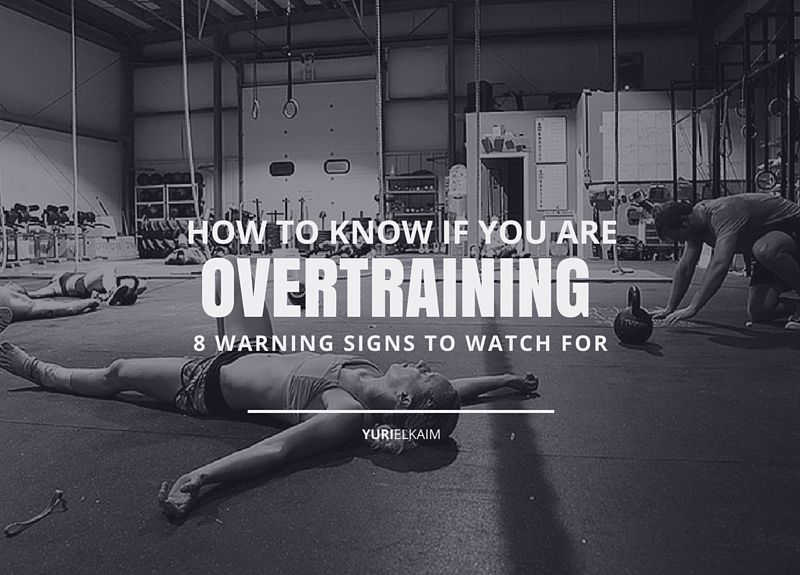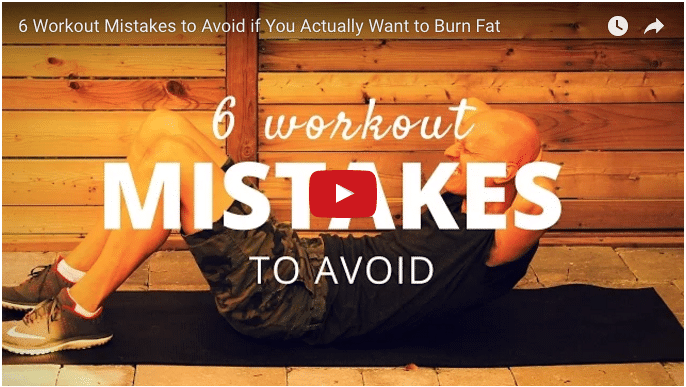In this article
You love your workouts. In fact, maybe you’ve been known to brag about your regimen, which sometimes includes two-a-days. Deep down there’s a chance you think rest days are for slackers.
Then it happens: One day you hit a wall.
You feel irritable, exhausted, and you wonder how the weights you once lifted with ease suddenly became so heavy.
And then you feel like maybe you are a slacker, because all you want to do is sit on the couch and watch a Netflix marathon.
What happened?
Those are all classic signs of overtraining.
Don’t worry. We aren’t going to argue that regular aerobic and resistance training exercise is dangerous for your health – in fact, it can be awesome for your health.
But too much of a good thing definitely can become a bad thing.
Is Overtraining Real?
Overstressing your body with too many physical demands over a long period of time can turn into the phenomenon of overtraining, which happens when your body becomes run down.
It can increase your chance of injury or even illness. Symptoms might include a high resting heart rate, sleeping difficulties, and exhaustion.
But the challenge for many is to believe that overtraining actually exists.
And whether you believe in it or not depends on your outlook, and maybe who you talk to.
If you ask the 20-year-old gym rat who is training seven days a week so he can flaunt his pecs and guns to all the girls on a Saturday night, he’ll tell you there is no such thing. (Until he hits the proverbial wall…)
On the other hand, if you talk about this topic with a trained health and fitness professional, he/she will paint for you a completely different picture.
Who to believe: The teenager or the professional?
The truth is that overtraining syndrome is a real physiological condition with real negative consequences. And it should be taken seriously.
Before we go over the warning signs, let’s back up a bit and take a look at what happens to your body physiologically when you overtrain. In other words, when you place excess stress on your body with no recovery period.
- Micro-tears to the muscles are created faster than your body can heal them
- Protein deficiency results because your body is depleted of amino acids
- Repeated intense workouts with no rest in between creates a calorie deficiency, which results in muscle tissue breaking down
- Cortisol (the “stress” hormone) is elevated for prolonged periods of time
- Your nervous and endocrine system become overtaxed
If we look at the whole health/fitness landscape it’s clear that physical activity has proven to offer excellent benefits both now and into the future.
It’s also true that we perhaps should heed the sage advice inscribed centuries ago on the temple of Apollo at Delphi, Greece – medan again, or “nothing in excess.”
Gain without Pain
But it’s possible to make classic overtraining mistakes if you are prone to pushing it hard.
Since mindset is such a big part of overtraining, it’s important not to be tough on yourself if you think you might be in the overtraining zone. Chances are you had nothing but good intentions and were fueled with hard-won motivation. Maybe even you even worked under the guidance of a trainer.
Fair enough? Here we go.
First, what exactly is overtraining syndrome?
Simply, overtraining is the result of giving your body more stress or work than it is capable of handling. Your body needs time to repair the damage.
Overtraining is also sometimes referred to as chronic fatigue, burnout, and overstress.
There are a couple different variations of overtraining:
One: Monotonous program overtraining occurs from using the same movements over and over again, as in the case of weight lifting and baseball batting.
If you fall into this category you may notice you have plateaued. Your central nervous system has simply adapted to the same routine and this lack of stimulation will not allow you to make gains.
Two: Chronic overwork overtraining is the type we are talking about here. It occurs when you train with too high intensity or high volume and not allowing sufficient recovery time for the body.
8 Common Signs of Overtraining
Since overtraining syndrome is not easily recognizable to the average person, here are some warning signs of overtraining to watch for:
1. Elevated Resting Heart Rate
There are a few ways to measure your resting heart rate (RHR) and the best time to do this is upon waking in the morning.
The optimal method is to take your pulse as soon as you wake up in the morning.
How do you know when you’ve done too much?
If your resting heart rate increases 5 beats per minute, this could be a sign that you need to take a break from working out for a while. If you notice it is high all the time, that’s a clear signal your body is stressed out and trying too hard to recover.
2. Chronic Fatigue
This is another symptom of overtraining and should not be confused with just being plain old tired after an explosive training session or a marathon run. Take note if you are still feeling tired even after having adequate rest.
[6 Workout Mistakes to Avoid if You Really Want to Burn Fat]
3. Decreased Strength
Your body needs to repair itself after a workout.
If you looked at your muscles while you were working out, they may look like a mini bomb went off as each time you resistance train, you are creating micro-tears at the microscopic level.
Proper workout recovery is key in allowing these tears to repair. Protein is the main muscle building nutrient required to repair the small micro-tears inflicted on the muscle with every challenging workout. Make sure you are consuming adequate sources of protein.
Tune into how you are feeling – every form of exercise is a form of stress on the body. Compound all these stressors and it can take a toll.
4. Unexplained Illnesses
A study conducted at the University of Wisconsin in Milwaukee on overtraining showed that athletes displayed signs of physiological danger primarily related to sustained high load training, often coupled with other stressors.
Researchers found a high percentage of illnesses could be accounted for when individual athletes exceeded individually identifiable training thresholds, mostly related to the strain of training (1).
5. Increased Muscle and Joint Pain
When you experience prolonged muscle and joint soreness it is a sign that the body is being asked to do too much, too soon and it’s letting you know that.
Good training means finding the right balance between stress and rest. The best way to handle overtraining, again, is to listen to your body.
Physically, the body reacts to this excessive stress in many ways. Also note that you have a much greater chance of experience a musculoskeletal injury due to overuse, including strains, sprains, tears, contusions and bursitis.
6. Progress Stalls
Have your fitness gains come to a halt? Or maybe you feel like you’re moving backwards in terms of your physical fitness.
Or maybe your drive and energy is like a rollercoaster: one day you feel like a machine and the next day you can barely move. Read this as a red flag.
Your adrenal system has moved into overdrive and that is taking a toll on your energy levels and your gains.
7. Your Enthusiasm Has Left the Building
There is a popular saying, “when in a hole, stop digging.”
While it’s tempting to push through the fatigue and burnout, it’s better to heed the signs and realize that you need more recovery time.
You might also want to create a training log which will aid you in keeping track not only your workouts, but also what you are eating and how well you are doing at refueling and rehydrating after a hard workout.
[The Best Homemade Electrolyte Drink for Quick Hydration]
That’s because inadequate nutrition and hydration can multiply the negative effects of overtraining.
If you are questioning whether you are in danger of overtraining, you can then look back at all of the information you have logged and try to figure out what went wrong and why.
8. You Feel Irritable, Angry, or Depressed
Yes, life stressors can make the best of us have a bad day every once in a while.
But if you notice that you are experiencing some of these other warning signs, coupled with irritable moods, it may be time to get serious about taking a rest from your high-performance workout schedule.
Prevention First, Repairing Second
Avoiding the pitfalls of overtraining may be simpler than you think.
One of the best ways to work out is a process called Intuitive Training.
This is the opposite of following a set structure. Instead, notice how you feel each day when you hit the gym. If you feel burned out, tired, and unmotivated, then take a step back and turn down the volume on your workout.
It’s that simple – and it allows you to better listen to your body and trust its rhythms.
The old adage, “Less is more,” is true: the good news is that you need to work out less often than you think.
Tune into your body and be familiar with the signs that point to overdoing it.
Overtraining Treatment Options
Treatment for overtraining requires that you cut back on training – or, if you are in a serious slump, you may need to stop altogether for 1 to 2 weeks. In extreme cases, a month or more of rest may be needed.
It can be very difficult for a person for whom training is a way of life to believe that they have overtrained and need rest. It is more effective to prevent overtraining in the first place.
Reducing the volume and/or the intensity of the training is perhaps the most obvious place to start.
A review of overtraining syndrome by the British Journal of Sports Medicine explained that cases need to be assessed on an individual basis in order to determine exactly how much rest is needed. It’s best to err on the side of caution, because more rest isn’t going to hurt.
And once overtrained, continued intense efforts will equal diminished performance.
If you follow a periodized approach to training – where you you cycle through different stages that increase stress placed on your body, but also allow for sufficient rest and recuperation periods – you can help avoid the syndrome.
Besides taking a training break and switching up how you cycle your workouts, some other actions you can take include;
- Split your training so that you are working different muscles groups on separate days
- Alternate “easy’ and “hard” days, with no more than a couple “hard” workouts a week
- Get more/better sleep
- Deep tissue massage
- Work out for shorter bursts of time with longer resting time
- Eat foods that aid in recovery
- Get enough calories to nourish your body
- Eat a balanced diet that contains adequate carbohydrates, lean proteins, and healthy fats such as omega 3 oils. Carbohydrates will provide the brain and body with adequate fuel, the oils help relieve depression and lower triglycerides, and proteins will help rebuild and repair overtrained muscles.
Listen to Your Body
Rather than constantly pushing through in “beastmode” all the time, it’s important to listen to your body’s signals in order to stay healthy and injury-free.
Think about it: when someone asks something of you, do you respond better to a gentle prodding or a hard beating? Your body isn’t much different.
Tuning in to what you’re body is telling you will go a long way toward keeping your progress coming without the dangers of overtraining.
Train Smart, Recover Smarter
Are your workouts beating you up? You probably just need a solid workout program. Get my 11 overlooked post-workout strategies to speed recovery, reduce stiffness, and help you feel unstoppable – for FREE – in my Workout Recovery Formula. You can download it now INSTANTLY by clicking the banner below.



